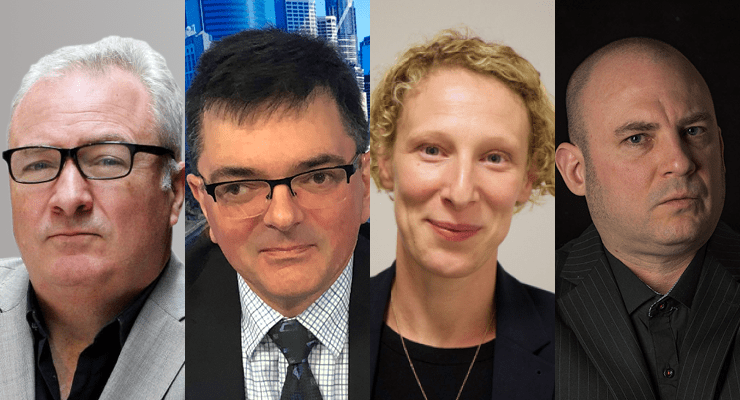
A varied panel joined Crikey Editor-in-chief Peter Fray yesterday for “Is the right side winning?”, a Crikey Talks event for subscribers looking at the recent growth of far-right extremism. Fray spoke to Macquarie University terrorism studies lecturer Lise Waldek, journalist Tom Ravlic, and former leader of the National Socialist Movement (NSM) Jeff Schoep, the self-described highest ranking neo-Nazi to ever walk away from the movement.
They discussed the influence of COVID-19, the specific and complicated paths in and out of extremism, and the role of the media.
The role of the media
A major topic for the panel was the tension between the need for the media to expose extremist groups and the risk of glorifying them.
“It depends on how we frame it,” Ravlic said. “Anyone who has a particular worldview will take comfort from getting media coverage, even if that reporting is critical, because it justifies to them that there is a system which is against them.”
Waldek said there had been enough conversations about the ethics of media reporting in this area.
“Our research has shown the role the media plays in how people understand the world,” she said. “For example, we saw a huge spike in the use of a certain platform because of mainstream media coverage of that platform. I’m not saying they shouldn’t have reported it but it comes with ethical baggage, and there aren’t enough conversations about that.”
Schoep, who now runs Beyond Barriers, an organisation that attempts to shift people away from extremist thinking, said that during his time in charge the NSM’s approach was “any publicity is good publicity”.
“We had our own media department, our own press releases, we’d contact the media to tell them about our rallies,” he said. “Because publicity equals recruits.”
COVID-19 fans the flames
The COVID-19 era has seen a flowering of various conspiracy theory groups opposing state measures like vaccines and lockdowns, often incorporating far-right ideology.
“With COVID people are getting more isolated, feeling wronged, and looking for someone to blame,” Ravlic said.
“I think COVID has escalated things,” Schoep said, agreeing that greater isolation played a part. “Just for one example, a guy who was allegedly a member of the NSM tried to blow up a hospital and was killed in a shootout with the feds.”
“It’s important to separate these things out,” Waldek said. “Violent extremists, all violent extremists, appropriate what’s happening in the world. They appropriate Islamic narratives and twist them, they appropriate COVID narratives, they appropriate wellness narratives.
“And right-wing extremists appropriate the language of conservative political philosophy… they are looking for hooks, for ways to suck you in.”
Where to from here?
So with COVID seeming to accelerate the mainstreaming of far-right and conspiratorial thinking already well underway during the presidency of Donald Trump and other right-wing populists, is there any cause for hope?
Waldek said research in the area had greatly improved in recent years.
“We understand a lot more about the individual process” of coaxing people away from extremist thinking,” Waldek said. “Our empirical research shows there is a lot of complexity in what leads people to violent extremism and such a lot of complexity about what leads them out, it shows what a specific individual approach we have to take with each case.”
Schoep said “meeting people from the other side, sitting with them, and hearing their stories” played the major role in his own de-radicalisation. It didn’t happen immediately, but it “planted the seeds,” he says, after 25 years of living in an echo chamber that de-humanised “the other”.
“When you’re in a group like that, I wouldn’t say it’s that you’ve lost your humanity,” he said. “But you’ve lost track of it.”








Missed the presentation but question could be, why is their only a wafer thin margin of difference between the utterances and themes of ‘extremists’, and many of our MPs in Federal Parliament and media? Because they are being fed and follow the same literature and influences like has been happening with the US GOP and media, UK too.
For example, anyone with any awareness knows the ‘great replacement’ was originally an anti-semitic dog whistle aimed at Jews (related to ‘The Protocols of the Learned Elders of Zion’), cynically weaponised again in recent years by Israeli American political PR types for the Hungarian govt. i.e. the ‘Soros Conspiracy’ and Muslim immigration (so Christian citizens can dog whistle Jews and/or Muslims).
Further, the ‘great replacement theory’ can also be linked to the old and new eugenics movement through a supposedly environmental prism of ‘population growth’ calling for immigration restrictions. Directly exemplified by much of the anti-immigrant policy round Trump White House through groups or ‘architecture’ of now deceased anti-semite and white nationalist John Tanton or ‘Tanton Network’ who was Steve Bannon’s muse….
So do you advocate unlimited immigration for this nation? Let’s here your take on population growth and immigration for Australia.
If you can offer a structured position, argument or question based upon credible sources showing some expertise form your side fine.
However, one avoids non questions, dog whistles and slogans masquerading as expertise, research and data analysis, although very popular in Australian legacy media on immigration, NOM, population growth, economics and climate science.
Patronising – I don’t agree (obviously)